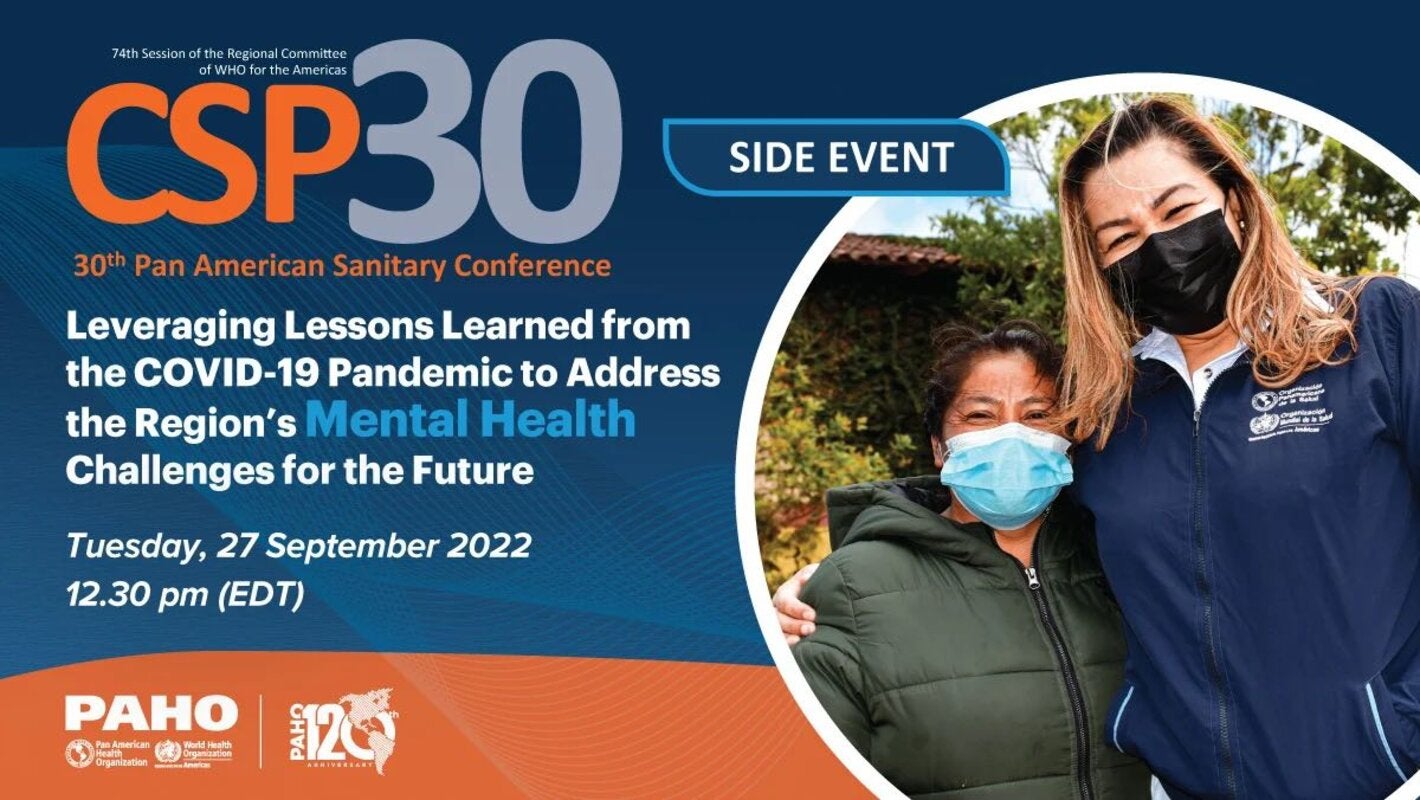
The PAHO Mental Health and Substance Use Unit of the Department of Noncommunicable Diseases and Mental Health will host a side event on mental health in parallel to the 30th Pan American Sanitary Conference, to be held in Washington, D.C. on Tuesday, 27 September 2022, at 12.30 pm EDT.
The one-and-a-half-hour meeting will feature presentations and discussions by authorities from PAHO subregions highlighting approaches to transformation and how countries hope to apply the lessons learned from the COVID-19 pandemic to address key mental health challenges in the Region in the face of future crises such as climate change and growing inequities in mental health.
How to participate
- DATE: Tuesday, 27 September 2022
- TIME: 12:30 PM [EDT] [check below the local time in other cities]
- LIVE TRANSMISSION: The event will be broadcasted on PAHO´s YouTube channel at https://www.youtube.com/c/PAHOTV and on the 30th Pan American Sanitary Conference webpage
- LANGUAGE: Interpretation available in English, Spanish, Portuguese and French.
Recording
Background
Mental health conditions represent a significant cause of morbidity and premature mortality in the Americas. Depressive disorders and anxiety disorders are the 2nd and 4th leading causes of years lived with disability respectively, and suicide mortality, which rose 17% between 2000 and 2019 in the Region, claims nearly 100,000 lives annually. However, the vast majority of people with mental health conditions will not receive treatment; the Region’s mental health treatment gap reaches as high as 90% for some conditions, with marginalized populations and people living in conditions of vulnerability experiencing significant barriers to care. Unaddressed poor mental health compromises the overall health and well-being of individuals and is linked to broader health and social consequences for communities and society.
The COVID-19 pandemic has contributed to elevated rates of depression, anxiety and other mental health conditions and to major disruptions to essential mental health services. Extremely high rates of violence in the Region, which has the highest homicide rate in the world, as well as increasing migration, driven by factors including social and political conflict, violence, food insecurity, natural disasters, environmental degradation, and economic hardship, also continue to impact the mental health of populations. Additionally, climate change, which contributes directly to extreme weather events of increasing frequency and intensity, as well as to indirect consequences such as increases in vector-borne and cardiorespiratory diseases, food and water insecurity, and forced displacements, is a substantial and growing threat to mental health in the Region. Looking ahead it is likely that these factors will have long-lasting adverse effects on some people’s mental health and well-being, which could increase demand for mental health services.
The current pandemic has raised the visibility of mental health, and this presents an important opportunity to advocate for mental health reforms as Member States build back better, more equitable, and more resilient mental health systems. Countries across the Region have found ways to implement innovative approaches to respond to mental health needs during the pandemic. As we implement the WHO Comprehensive Mental Health Action Plan (2013-2030) and discuss the PAHO Policy for Improving Mental Health at the 30th Pan American Sanitary Conference, the time is now that the experiences and lessons learned from COVID-19 pandemic be applied to deepen the value and commitment given to mental health, reshape the environments that influence mental health, and strengthen the systems that care for mental health.
This side event will feature presentations and discussion by authorities and stakeholders from PAHO subregions highlighting approaches to transformation and how countries hope to apply the lessons learned from the COVID-19 pandemic to address key mental health challenges in the Region in the face of future crises such as climate change and growing inequities in mental health.
Agenda
- Opening Remarks
- Dr. Carissa Etienne Director, Pan American Health Organization.
- Panel 1: Elevating Mental Health in National and Regional Agendas
- The Honorable Dr. Carolyn Bennett, Minister of Mental Health and Addictions and Associate Minister of Health, Canada, on the role of Canada's Minister of Mental Health and Addictions
- Dr. Theresa Tam, Chief Public Health Officer, Canada, on Canada's domestic work in mental health, focusing on equity and inclusion.
- The Honorable Dr. Carla Vizzotti, Minister of Health of Argentina, on the country's presidential initiative on mental health.
- H.E. Epsy Campbell Barr, Former Vice President of Costa Rica and Chair of the PAHO High Level Commission on Mental Health and COVID-19 on the establishment and work of the PAHO High-Level Commission on Mental Health and COVID-19.
- Panel 2: Mental Health in the COVID-19 Pandemic and Beyond: Applying Lessons Learned from COVID-19 for Transformative Change
- Dr. Renato Oliveira e Souza, Chief, Mental Health and Substance Use Unit, Pan American Health Organization: a regional overview on lessons learned from COVID-19 for the future.
- The Honorable Dr. Ian Gooding-Edghill, Minister of Health and Wellness of Barbados on climate change and mental health.
- Mr. Jose Martin Yac Huix, Director, Asociación IDEI, Guatemala, on promoting equity and representation in mental health.
- The Honorable Dr. Ximena Aguilera Sanhueza, Minister of Health of Chile, on strengthening human rights for mental health and scaling up technological solutions to expand access to mental health care.
- Question and Answer Session
- Moderator: Dr. Anselm Hennis, Director, Noncommunicable Diseases and Mental Health Department, Pan American Health Organization.
- Closing Remarks
- Mr. Ambassador Nestor Mendez, Assistant Secretary General Organization of American States.
Time correspondence
- 9:30 am.– Los Angeles, Vancouver
- 10:30 am. – Belmopan, Guatemala City, Managua, San Jose (CR), San Salvador, Tegucigalpa
- 11:30 am. – Bogota, Mexico City, Panama City, Kingston, Lima, Quito
- 12.30 pm. – Asunción, Bridgetown, Caracas, Castries, Georgetown, Havana, La Paz, Nassau, Ottawa, Port-au-Prince, Port of Spain, San Juan, Santo Domingo, Washington DC
- 1:30 pm – Buenos Aires, Brasilia, Montevideo, Paramaribo, Santiago
- 6:30 pm. – Geneva, Madrid
For other cities, check the local time in the following link.
Related links
